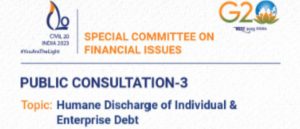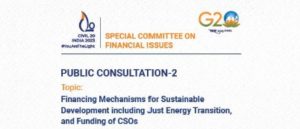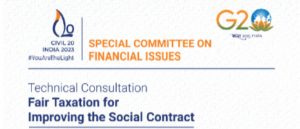Special Committee on Financial Issues
Civil20, India 2023
About us
India’s G20 presidency strives to find pragmatic people centric global solutions for a just and equitable growth for all in the world thereby truly manifesting the spirit of “Vasudhaiva Kutumbakam” or “One Earth, One Family, One Future”.
The financial system is the engine that powers not only nations and their governments’ functioning, but also the universe of private corporations and enterprises that are the units of value-creating economic activity, and that which sustains families, and local communities. How well are our financial systems serving our purpose? Are the various financial instruments designed to solve problems and overcome market failures creating the right outcomes for society at large and for its more vulnerable members? Are banking and credit systems serving their purpose, or are they destroying value? Are they reducing inequality or perpetuating it in new ways?
Across the world, domestic and international banking systems and multilateral financial institutions continue to evolve a repertoire of tools to support the poor and the more vulnerable, be they economically vulnerable people, communities, or states. The advent of new forms of digital currencies, and internet-driven and tech-driven business models in finance hold great promise and can contribute to this repertoire. However, the Covid pandemic and the unprecedented climate crisis has brought to fore many issues, aggravating existing ones, and resurfacing others in newer or stronger ways. Many developing nations find themselves having to deal with multiple crises with only limited fiscal resources at their disposal. These countries’ relatively higher reliance on corporate income tax makes them more susceptible to the harms of base erosion and profit shifting, further limiting their fiscal capacity.
The Special Committee of the C20 on Financial Issues believes that a sustained recovery from the multidimensional crises experienced by many nations will require financial and economic systems that are strongly aligned to solving for its core issues meaningfully. The creation and smooth running of state-supported machineries and global economic processes that can achieve just, equitable growth and sustainable development for its people while also caring for its natural heritage and contributing to the sustenance of our planetary ecosystem, is instrumental to achieving the goal of Vasudaiva Kutumbakam. This will require fundamental changes to the roles and functions that financial capital and the global financial architecture perform in the lives of the planet’s citizens and other living beings.
Upcoming Events
Past Events
Sub-themes of the SCFI
Sovereign Debt Restructuring and Development
We are facing today a global crisis of income and wealth distribution. As countries recover from the devastating effects of the pandemic, they have had to deal with the spikes in energy prices brought about by Russia’s invasion of Ukraine. The world economy continues to be tightly interwoven even if there is a renewed focus on regional and domestic inputs. Even if one were to imagine it becoming less connected as compared to the past decade, the scale of issues facing nations is global, and as such, local, national solutions are likely to be inadequate to solve for these. At the same time, many governments are facing growing debt burdens and cannot finance these on their own. Inflation concerns are rising across nations and interest rate increases in developed economies are leading to volatility in international capital flows.
These and other global headwinds have negative implications for both debt sustainability and the macroeconomic ‘fiscal space’ for many developing nations, sharpening the sovereign debt crises. A significant number of sovereign debt restructurings will be needed to ensure debt sustainability, both in middle-income and low-income countries. Yet, the attempts so far at finding solutions have overwhelmingly focussed on fiscal consolidation, which will create more social and political tensions and limit the scope of much needed public and private investment in frontier industries and social protection mechanisms. There is a need for new thinking to bear on this problem.
Fair Taxation for Improving the Social Contract
The phenomenon of the rise of economic globalization through digitization of the financial system is another big challenge. For developing countries and LDCs, progress in financial digitalization systematically harms them with the practice of "eroded tax base" because the current global financial structure and system allows for tax avoidance and evasion, especially by multinational corporations through profit shifting and other practices to avoid paying taxes in the jurisdictions where they operate or where profits are made. Tax avoidance and evasion certainly undermine the ability of all countries to invest in sustainable development. Illegal financial flows also contribute to worsening inequality and equity, both within countries and between countries. Civil society organizations that are members of Civil 20 demand the democratization of global tax governance under the auspices of the United Nations through the UN Tax Body. The establishment of such an intergovernmental tax body must be accompanied by the adoption of the latest UN Tax Convention, and this must sit alongside other efforts.
At the domestic level, a wealth tax is needed to ensure the principle of equity and/or distributive justice. Those who have more should contribute more to society, and that the burden of taxation should be distributed fairly across all members of society. A wealth tax can have positive economic effects by promoting greater investment in the economy. By reducing the concentration of wealth and promoting a more even distribution of resources, a wealth tax can help ensure that resources are invested in productive activities that benefit the broader economy. This can help reduce the gap between the rich and poor and promote a more equitable distribution of wealth.
Financing for Sustainable Development
The presidency inherits global economic slowdown, geopolitical uncertainty and supply chain disruptions, increasing vulnerability towards climate risks and most importantly dramatic impacts of COVID-19 pandemic which has pushed back years of progress made towards the sustainable development goals thus widening inequalities within and between countries. At this juncture, financing for SDGs assume critical importance particularly for developing countries which face challenging trade-offs in the allocation of finance for short term economic recovery packages vis a vis long term packages for sustainable and holistic development. In order to bridge this financing gap all funding sources (public/private, domestic/international) coupled with effective policy reforms need to be leveraged to achieve SDGs in line with the objectives under the Paris Agreement. In order to catch up with the ambitions of the 2030 Agenda and to close the widening financing divide, it is time that international finance architecture is explicitly required to be aligned with all aspects of the SDGs so that all financing flows can become aligned with them. This will require an honest acknowledgement of tradeoffs involved and also bring to focus the need for reflecting costs of negative externalities into economic activities. Alongside this, there is a need to give civil society organisations a ‘seat at the table’ since they are the second most important stakeholder for the success of the SDG Agenda, the first being the communities themselves for whom the SDG Agenda is meant to impact.
Humane Mechanisms for Discharge of Personal and Enterprise Debt
Micro Small & Medium Enterprises (MSME), and among them, sole-proprietorship firms are major growth engines for developing countries and the lifeline for a majority of their citizens. The environment that the country provides to its enterprises, to dream, innovate, clinch opportunities, solve problems and generate value, will determine the growth trajectories of many promising enterprises and start-ups. One determinant that seldom gets attention is the manner in which failure of the enterprise is treated and whether society will victimise the owners of such enterprises or support them in restarting economic life in other ways. The tremendous push for financial inclusion by various multilateral organisations and national governments is also led much by credit inclusion targeted towards MSMEs and households. Today, households and other non-corporate sector participants such as a majority of MSMEs and incorporated start-ups are beginning to access formal debt from the banking and allied systems (including fintech and mobile lending, working capital financing, debentures and other capital market instruments).However, unlike informal debt, formal debt is constrained by contractual terms and an inability to repay will result in other barriers in accessing credit and other financial services, as well as negatively impact the wellness of its citizens.
Further, debt overhangs can also develop within unincorporated enterprises and households due to idiosyncratic shocks too (in addition to systemic shocks like the pandemic), such as commodity price shocks and other economic shocks, health shocks, natural disasters, climate shocks and are expected to become a serious macro problem because of the exacerbating effects of the slow pandemic recovery. More mundane reasons pertain to poor timing and execution skills, technical and accounting skill gap, and so on.
A humane statutory mechanism for the restructuring or discharge of debt is a crucial instrument through which borrower enterprises and households can seek refuge and this needs to be built by governments. Individuals and households that rely on their own entrepreneurial abilities to support themselves will derive the most welfare benefit from this mechanism. This comprises an overwhelming majority of citizens in developing nations.
Convenor
Deepti George, Dvara Research, India
Members
- Dr. Arjun Jayadev, Azim Premji University, India
- Mr. Anup Mahapatra, India
- Mr. Irvan Tengku Harja, The Prakarsa, Indonesia
- Ms. Dwi Rahayu Ningrum, The Prakarsa, Indonesia
- Mr. Claudio Fernandes, GESTOS, Brazil
- Mr. Riccardo Moro, LVIA, Italy
Recommendations Submitted to the Independent Expert Group for Strengthening the MDBs, under the G20
Special Committee on Financial Issues Civil20, June 2023
The SDG Agenda, the sovereign debt crisis and the climate crisis will need brave leadership from not just individual governments of both the global north and the south, but also groups such as the United Nations, the G20, G7 and others, to closely negotiate tough decisions that can have enough impact on the triple inequality – of wealth, carbon and power. For this, the Multilateral Development Banks (MDB) are unique in that they bring with them the firepower and balance sheet size to back bigbudget funding needs on the back of the above tough decisions that need to be made. Given their multilateral ethos, they are also uniquely placed to fund solutions for global public goods in a systematic and in a least-conflicted manner. However, their history and their organizational decisionmaking mechanisms may make these institutions too unwieldy to deliver solutions in time to have high impact for the entire planet. An inability to deliver this imperative will be catastrophic – as this would see a global rise in humanitarian and ecological disasters, and the emergence of more regional efforts that will likely prioritize regional interests over solving for problems of a global nature, and distinctly ‘zero-sum’ interactions between countries that will leave the planet and its people worse off. This also will indicate a decline in the global relevance of the MDBs themselves. Such a scenario is imminent given many countries are being pushed towards choosing between two divergent paths – whether to collaborate, including via multilateralism and its rule-based frameworks, or whether to embrace ‘economic decoupling’ in order to achieve greater risk mitigation for themselves1.
To avoid the above situation, the Civil20 shares its views below on how MDBs can take on this challenge, and these views add to the many views already shared by stakeholders across the globe.
Advanced nations must cede more ground to make SDRs work for the rest of the globe
Among the MDBs, the Bretton Woods Institutions, namely the International Monetary Fund (IMF) and the World Bank, are the largest and most powerful, with their larger backers being the wealthier, more powerful advanced nations. In particular, the Civil20 calls for a focus on the issuance of Special Drawing Rights (SDRs) under the IMF. It has been known that the country quota for SDRs is not proportionate to population of the countries involved, both India and China for instance have low voting shares compared to their populations. Quotas are not just the capital-base of the IMF, they also determine member states’ voting shares, share of SDR issuance, maximum lending access and, crucially, the costs of borrowing. The Civil20 supports the call already made by many voices2 to change IMF’s Articles of Agreement to say that SDRs can be issued on a more regular basis and not just for exogenous shocks; that this be done with no conditionalities, and that the SDR issuance be delinked with the quota system. In addition, the IMF’s Board can be replaced with a voting system that involves all member States.
Revamping the ambition of MDBs to make them fit-for-purpose to take on the global polycrisis
While there have been several calls requiring concerted efforts on the part of MDBs and allied institutions to bring in the SDGs into their board-level strategy-setting and evaluation mechanisms, the World Bank’s Evolution Roadmap only acknowledges the need to evolve its mission to strengthen development impact in its 2023 Roadmap3. The leadership at the MDBs, and especially the World Bank and the IMF must lead the way in bringing about this very important shift within their own organisations as a pre-requisite to modernizing governance, representation and operations. This would be a vital prerequisite, through demonstration, for other MDBs to follow suit, though not a bottleneck. This reorientation must be guided by an honest acknowledgement of the tradeoffs involved in the current approach (in the case of the World Bank, poverty reduction and economic growth without the need to meet the SDG Agenda), and the new tradeoffs that will need to be acknowledged, the levels (of the new tradeoffs) accepted, and with such a reorientation introduced (poverty reduction through sustainable development versus solving for global public goods)4.
The Civil20 also calls for the World Bank and other multilateral lenders to implement core recommendations of the G20 Capital Adequacy Framework in order to significantly ramp up their lending capacity. In particular, mobilization of private sector funding will need a significant rethink,
and while the reluctance to let go of their ‘low-risk, highly-rated’ status is understandable, using their balance sheet and rating strengths to build books using significant originate-to-share and originate-totransfer mechanisms5, through the provision of credit and other enhancements, is perhaps the only way to get to the level of funding that is needed to be unlocked for many components of the SDG Agenda that already have proven solutions but are in need of support to overcome the initial viability / feasibility hurdle for commercial capital to pursue them on their own.
Implement Steps to provide the Social and Solidarity Economy a ‘Seat at the Table’
Economic growth and development today can no longer afford to not be devised without passing the sustainability test. For this, much greater investment in achieving and maintaining social cohesion is needed. The civil society organisations (CSO) have been acknowledged through the past many decades as being important to the agenda of MDBs. However, baring very rare instances, the manner in which CSOs have been required to be involved, has overwhelmingly been as observers in the planning stages, and as service providers who do not really have decision-making responsibilities or voting powers. CSOs are also the second most important last-mile stakeholders shaping outcomes
when it comes to achieving the SDG Agenda (the most important being the communities themselves). No government or private sector corporate can claim to have as much sway over the implementation of outcomes for the SDG agenda as the CSOs.
The UN has indeed defined the social and solidarity economy. The SSE not only uplifts the most vulnerable in our societies but also rebalances the social, economic, and environmental objectives which serves the long-term viability and flourishing of all societies. The UN’s General Assembly Resolution in April 2023 on the Social and Solidary Economy sets the stage for a much better future for CSOs as active economic actors and decision-makers in the economy. A simple way to articulate the functions for CSOs in achieving the 2030 Action Agenda, adopted from a Technical Paper6 of UNDESA, is in a) Implementation via regulation (as watchdogs), b) Representation (as voice for people, especially those ‘left behind’), and c) Realisation of sustainable development outcomes through service delivery. Taking guidance from such a framing, the MDBs can device a high-level independent panel through which CSOs are required to take part when new projects and programs are being envisaged so that their role gets expanded much beyond that of being service providers.
In line with many recent trends7 that place more power and ability to the communities in deciding how they would like to shape their sustainable development outcomes, the World Bank and IMF can consider adopting a much more nuanced approach to the choice of outcome metrics for their various projects and programs. For instance, in 2018, the UNRISD commenced a four-year project to address these issues. The project’s aim was to develop methodologies and indicators to meaningfully measure and evaluate the performance of a broad range of economic entities in relation to the vision and goals of the 2030 Agenda. The learnings8 from this effort can be used for this purpose to transform the declared intent of focusing on sustainability into real outcomes for the World Bank and IMF.
1 “The stark de-risking choice facing economies”, Mohamed El-Erian. Financial Times, May 25, 2023
2 “Reforming the IMF”, Mona Ali. Phenomenal World, May 13, 2023; “Reallocating Special Drawing Rights (SDR) for Vulnerable Countries”, webinar co-hosted by Center for Global Development and the Foundation for Studies and Research on International Development, July 2021
3 The report titled “Evolution of the World Bank Group – A Report to Governors”, released on March 30, 2023, and prepared for the April 12, 2023 Development Committee Meeting of the World Bank builds on this to a very limited extent.
4 A brief discussion on the topic can be found in “For the World Bank to Address Global Challenges, It Needs to Address Trade-Offs Head On”, Ranil Dissanayake, Blog series of the Center for Global Development, April 12, 2023
5 “The time is now: what the World Bank’s (R)evolution Roadmap should look like”, ODI, May 16, 2023
6 UN Dept of Economic & Social Affairs publication “How should civil society stakeholders report their contribution to the implementation of the 2030 Agenda for Sustainable Development?”, 2019
7 See “Donor Statement on Supporting Locally Led Development”, US AID, Announced on December 13, 2022 at the 2022 Effective Development Cooperation Summit in Geneva.
8 “Authentic Sustainability Assessment: A User Manual for the Sustainable Development Performance Indicators”, UNRISD, November 2022




